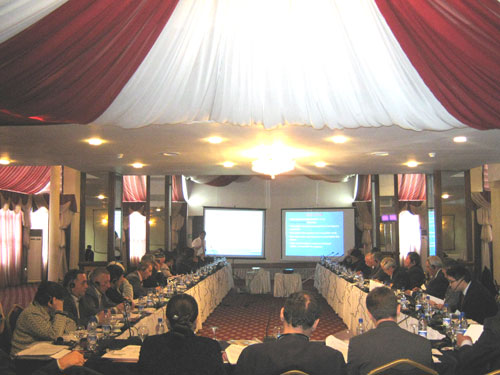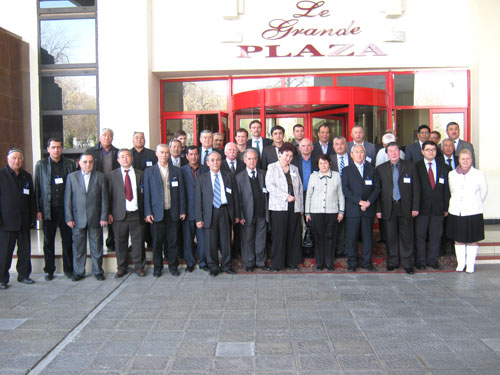REGARDING “WATER PRODUCTIVITY IMPROVEMENT at PLOT LEVEL (WPI-PL)” PROJECT ACTIVITY
The seminar-meeting and the Project Steering Committee meeting, which reviewed the report for the January-December 2010, the annual work plan for January-December 2011, the budget implementation and other issues associated with implementation of the project were held on March 11, 2011. 
The main achievements of the WPI-PL project for the reporting period are as follows:
- New innovation cycles to improve the quality of innovation and further dissemination of tested technologies are implemented on a continuous basis.
- Project awoke the users' interest in the use of innovations to which the economic benefit of water users is laid as the basis.
- The project formed a farmers' notions on measurability of irrigation water, the possibility of its control and payment for actual water volume use.
- Within the Kyrgyz and Tajik parts of the project the complete package of documents for water accounting and payment is developed, the mechanism for interaction between the WUAs and farms and a mechanism of transition from the mode of payment for hectares to the payment for water volume are established.
- Within the Uzbek part of the project the main economic incentives for regulated water use are identified.
- The policy of technology dissemination for each country is developed.
- The research institutes of the three states have developed guidelines for farms on agricultural and hydraulic engineering issues that meet the farmers' needs on the basis of their achievements and international experience.
- Principles for establishing and developing the mechanism of interaction between water users and WUAs with involvement of key specialists (agronomist-hydraulic engineers) are created.
- The partners recognize the high interest of farmers in Kyrgyzstan to the irrigation water management mechanism for small areas which was developed within the project.

Under the project component "Equipping the WUA's canals and farms with water-measuring facilities (WFM-2)" within the "WPI-PL"project and "IWRM-Fergana" project (including the WUAs in the TMP area) the water measuring structures were constructed in following amounts:
- Tajikistan: planned - 124 units., constructed - 109 units. That is - 88% of the planned ones.
- Uzbekistan: planned - 385 units., constructed - 302 units. That is - 78% of the planned ones.
- Kyrgyzstan: planned - 75 units. The preparatory activity is being conducted. The construction will start on April, 2011.
The drip irrigation system is constructed in Uzbekistan on 37 hectares within the component "Drip Irrigation". In Namangan the drip irrigation system covers 27 ha of vineyard, in the Fergana region - 10 hectares of sweet cherries. Both systems will be launched up to the vegetation period of 2011.
REGIONAL SEMINAR WITHIN THE COLLABORATIVE PROGRAM ON CAPACITY BUILDING OF INTEGRATED WATER RESOURCES PLANNING AND MANAGEMENT IN CENTRAL ASIA
The third regional seminar organized by the SIC ICWC under support of the UNESCO-IHE was held on March, 9-11, 2011 in Tashkent. The aims of this seminar were as follows:
- Demonstrating readiness by future national trainers to organize and conduct the national seminars in each country;
- Involving representatives from the higher schools into the joint program implementation and further improvement of training materials.
The seminar was attended by 36 participants. The leading specialists of SIC ICWC have developed the training materials regarding 4 main themes:
- Integrated Water Resources Management (IWRM);
- Irrigation agriculture improvement (IAI);
- International Water Law and Policy (IWLP);
- Regional Cooperation on Transboundary Rivers (RCTR).
These materials have been previously distributed to the future national trainers, representatives of the five Central Asian republics to study the possibility of their adaptation to the each country conditions. In order to start the educational materials review and to improve the organization of national trainings, as well as to involve students, there were invited to the seminar not only representatives from water management agencies selected by the ICWC's members, but also the representatives of higher education. Their involvement in the training process at the national level will no doubt be of mutual benefit and enrich both the training program and the education program in institutes of higher education.
There is a tremendous need for training. Today over 12 thousand people, including not only representatives of middle management, but also of low level - WUA, who need a knowledge on legal issues, organizational activities, water use planning and financial sustainability, have been trained in the framework of three major projects being implemented in the Ferghana Valley in the Kyrgyz Republic, Tajikistan and Uzbekistan.
The Central Asian countries have a shared water resources, what requires improving the normative legal base of regulating regional relations in the water sector on the basis of international experience. Therefore this kind of events is very important because the rules based on the research results and investigations can be considered and established during these events. It is therefore necessary to ensure the sustainability of these training courses and to conduct a training course at the advanced level.
The ideas on organizing and conducting the national training seminars were briefly outlined in the reports of keynote speakers from every country.
Mr. Joop de Schutter denoted the aims of the network in his presentation "Developing the capacity building network on water resources management, water infrastructure governance and environment management. Necessary conditions for future development":
- Providing development of information network and knowledge base in water resources management, water governance sphere in order to identify needs in the developing of human and institutional capacity at the regional, national and local levels;
- Developing and strengthening a decentralized system of training and presentation of training in the management of water resources, infrastructure and environment within the approved themes:
- Integrated Water Resources Management (IWRM);
- Irrigation agriculture improvement (IAI);
- International Water Law and Policy (IWLP);
- Regional Cooperation on Transboundary Rivers (RCTR).
- Involving the teachers from universities and national trainers into the training process; developing and implementing a program of courses focused on demands, and related modules for specific target groups at different (upper, middle and lower) levels in various formats (certified courses, seminars, role-playing games, field works, etc.), and using various teaching and training formats and technologies such as specialized manuals, guidelines, multimodal learning approaches, distance learning, etc.
In order to achieve these goals the following is being proposed:
- To prepare a final version of the learning material; to adapt the learning material to each country's conditions; to organize national training seminars (a training is really needed to be suited to different levels - it requires a lot of work);
- To be agreed with the network objectives; to formulate rules, rights and responsibilities for the partnership; increase the participants' number (SIC ICWC, BWO, universities, specialized institutions); to organize coordination and participation, to invite Afghanistan;
- To formulate the project proposals to continue the network activity on capacity building on water resources management, water infrastructure governance, environment management, and searching financial support (international funds).
- Further development of knowledge and the exchange of potential through the establishment of professional communities (PC) on specific topics. Involving specialists.
- Development of marketing strategy, business plan and network's strategy in order to ensure sustainability.
- Creating a website dedicated to network's capacity building, including a map of knowledge, and various products concerning the capacity building.
Mr. Umarov P.D., summing up the seminar, stressed the following points:
- the optimal number of participants at the national workshops on training future trainers is 20 persons;
- it is needed the training for future professional trainers who are ready to work on all four areas listed above;
- to accept the proposal of organizing the extension courses for trainers who need oratorical skill, psychology and ethics;
- to understand that the training is needed, above all, for the countries of Central Asia and to seek the support of this understanding in every country;
- It is necessary to ensure the available educational material; it must be easy understood by each target audience;
- the training objectives should be clearly defined because the result of conducting training depends on these ones;
- the educational material has to be translated into national languages;
- when preparing the modules the trainers are needed to be flexible because in such a case they can adapt the course content to local conditions and audience;
- to ensure recognition of the certificates after passing through these training courses and increase their importance up to the level of diplomas.
UZBEKISTAN HAS AFFILIATED TO THE INTERNATIONAL COMMISSION ON LARGE DAMS
On 25 March 2011 the Cabinet of Ministers adopted Resolution ? 88 "On organization of the National Committee of Uzbekistan on Large Dams."
The aims and objectives of the National Committee of Uzbekistan on Large Dams given in this provision are to promote the interests of the Republic of Uzbekistan in the sphere of ensuring security of large dams, the rational use of transboundary water resources; improvement of dam safety by examining the experiences of other countries; exchange of scientific and technical information between the national committees of other countries.
In line with the defined tasks the activities of the National Committee of Uzbekistan on Large Dams are the introduction and spreading of modern methods and technologies in the design, construction and operation of large dams on the basis of studying the advanced practices; the conducting of seminars and conferences on safety of large dams, and of trainings to develop human and institutional capacity, etc.
|